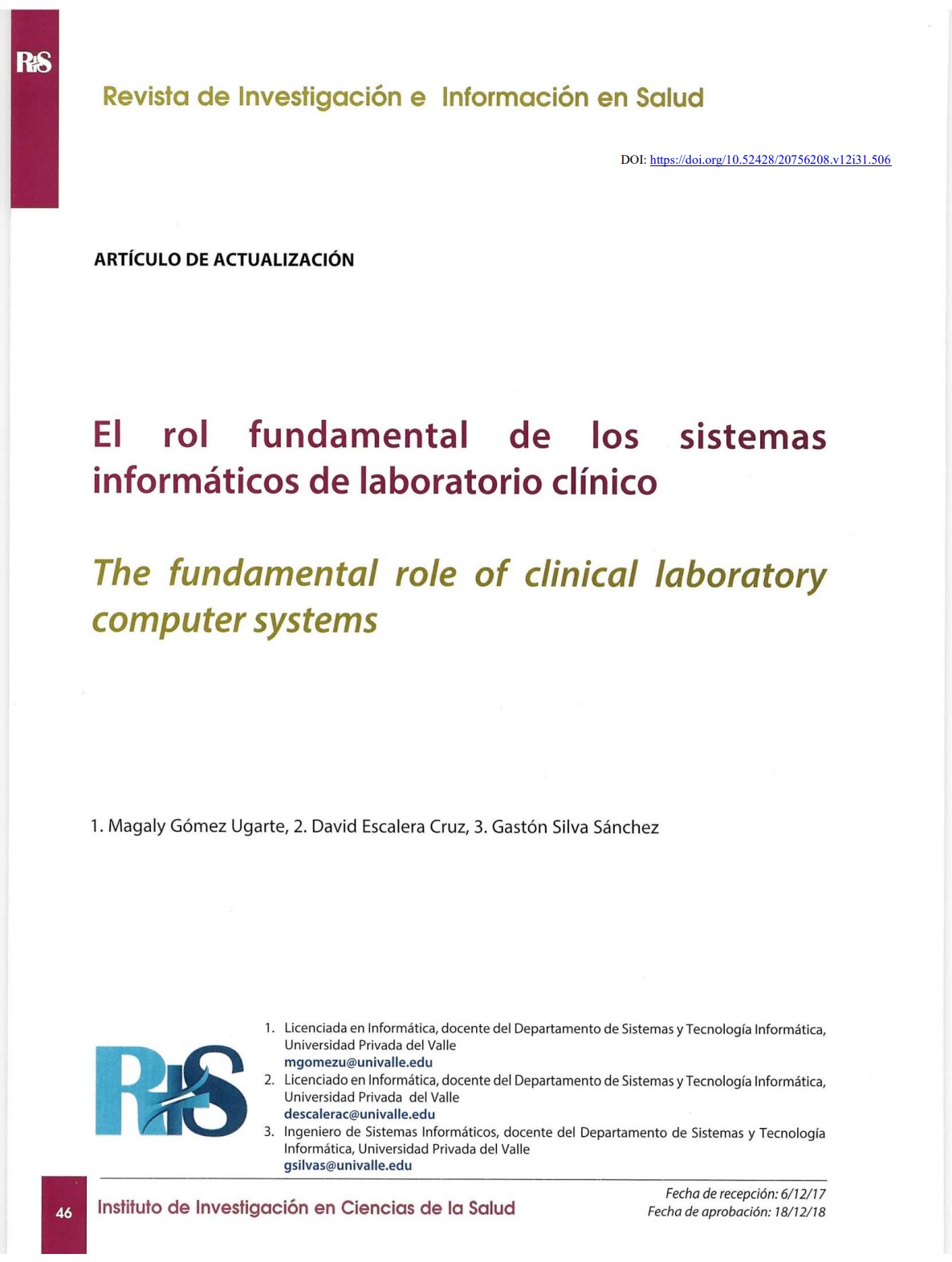The fundamental role of clinical laboratory computer systems
DOI:
https://doi.org/10.52428/20756208.v12i31.506Keywords:
Information systems, Computing in the clinical laboratory, Clinical examinationAbstract
The objective of this research project is to demonstrate the role of the laboratory information systems clinical trial conducted by teachers of the Department of Systems and Computer Technology of Universidad Privada del Valle, in health.
The researchers of this project assume that teachers should be inclusive in accordance with the scientific and technological progress in response to social needs; actions that are in line with the institutional mission and vision of the university.
The Department of Systems and Computer Technology has been carrying out sustainable activities of research and social interaction in different areas, with a strong impact in health, to respond to the needs of the municipality of fencing and Tiquipaya population.
For the activity of social interaction in multidisciplinary teams by the Faculty of Health Sciences and the Department of Systems and Tl, (addressed to "determine the prevalence of intestinal parasites in children under the age of 12 years, the Nursery Infant Jesus of Prague from the town of Tiquipaya, during the II/2015"), the development of the clinical laboratory computer system with the purpose of registering and processing all information coproparasitologica, until the release of the final report, critical to the success of the activity and decision-making of preventive and corrective measures determined by the team of researchers in the area of health.
As a methodology ofdevelopment of the computer system, clinical laboratory was used Rational Unified Process (RUP), Unified Modeling Language (UML), Design Patterns Model View Controller (MVC), C# programming language, and manager of the Sq/Server database.
The computer systems of clinical laboratories are indispensable and fundamental for ensuring the accuracy, consistency, and reliability in data processing in the laboratory.
Downloads
References
López Urrutia, A. El laboratorio general: mecanización y gestión. [Internet] 2004 [Consultado el 10 de octubre de 2017.] Disponible en: http://www.conganat.org/seis/informes/2004/PDF/CAPlTUL05.pdf
López Urrutia, A. Manual de salud electrónica para directivos de servicios y sistemas de salud-CEPAL. [Internet] 2012 [Consultado el 10 de octubre de 2017.] Disponible en: http://www.seis.es/documentos/informes/secciones/adjunt01/04_Sistemas_de_informacion_del_laboratorio_clinico.pdf
Larman, C. UML y patrones: una introducción al análisis y diseño orientado a objetos y al proceso unificado. Ed. N O 2. 8420534382, 9788420534381. s.l. : Pearson Educación; 2003,
Silberschatz A. y Korth H. Principios de bases de datos., 5 0 Ed. 8448156714. s.l. : McGraw-Hil; 2007
Rod S. Diseño de bases de datos. 9788441525788. s.l. : Anaya Multimedia, 2009.
NEXUS-IT. Openlab, el sistema de información de los laboratorios clínicos de hoy y del futuro. [Internet] 2017. [Consultado el 1 de noviembre de 2017] http://www.nexus-it.es/soluciones/openlab/
LABWARE. Sistema de información de laboratorio. [Internet] 2017. [Consultado el 1 de noviembre de 2017]

Downloads
Published
How to Cite
Issue
Section
License
Copyright (c) 2017 Magaly Gómez Ugarte, David Escalera Cruz y Gastón Silva Sánchez

This work is licensed under a Creative Commons Attribution 4.0 International License.
Authors who publish with this journal agree to the following terms:
- Authors retain copyright and grant the journal right of first publication with the work simultaneously licensed under a Creative Commons Attribution License 4.0 that allows others to share the work with an acknowledgement of the work's authorship and initial publication in this journal.
- Authors are able to enter into separate, additional contractual arrangements for the non-exclusive distribution of the journal's published version of the work (e.g., post it to an institutional repository or publish it in a book), with an acknowledgement of its initial publication in this journal.
- Authors are permitted and encouraged to post their work online (e.g., in institutional repositories or on their website) prior to and during the submission process, as it can lead to productive exchanges, as well as earlier and greater citation of published work.






















